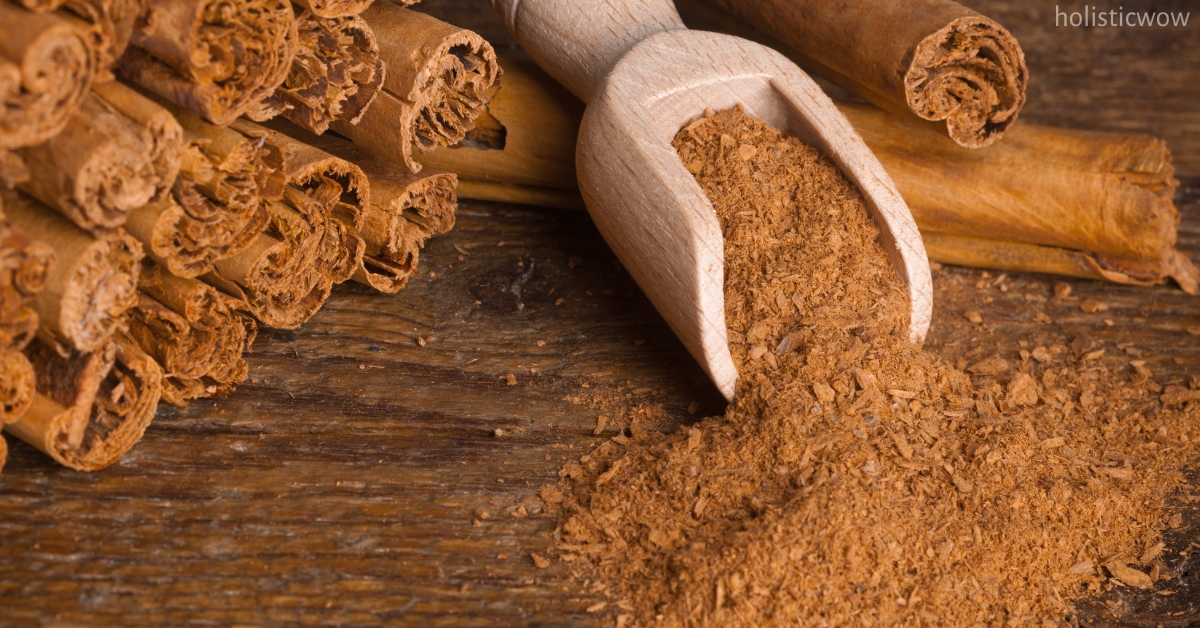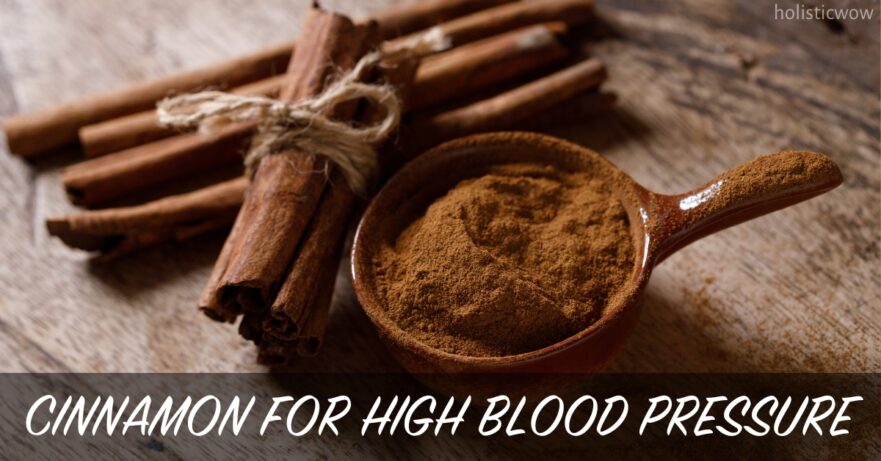What Is the Impact of Cinnamon on High Blood Pressure?
Cinnamon may have a statistically significant effect on lowering systolic blood pressure (SBP), particularly in individuals with stage 1 hypertension.
While the reduction is considered clinically moderate, it remains significant.
Clinical studies suggest that cinnamon supplementation—especially at doses of 1.5 to 2 grams per day for at least 8 weeks—can lead to a modest but significant reduction in mean ambulatory SBP, particularly in individuals with hypertension.
In several studies, participants who consumed cinnamon experienced a greater decrease in systolic blood pressure compared to those taking a placebo, particularly after periods of approximately 8 to 12 weeks.
This effect is thought to be linked to cinnamaldehyde, a key compound in cinnamon, which may support blood pressure regulation by improving vascular function and reducing oxidative stress and inflammation.
Moreover, cinnamon may help improve lipid profiles by reducing LDL-c (the “bad” cholesterol) and, in some cases, increasing HDL-c (the “good” cholesterol), which could potentially safeguard heart health.
These changes support cinnamon’s role as a complementary approach to managing hypertension.
However, cinnamon should be used as part of a broader dietary change and always in conjunction with prescribed treatments, not as a replacement for controlling high blood pressure.
Key Takeaways
- ❤️ Cinnamon for Blood Pressure: Cinnamon may help lower systolic blood pressure, especially in individuals with stage 1 hypertension, when taken in doses of 1.5 to 2 grams per day for at least 8 weeks.
- 🌿 Bioactive Compounds: Cinnamaldehyde, a key compound in cinnamon, may improve blood pressure by promoting vasodilation and reducing oxidative stress.
- 💓 Heart Health Benefits: Cinnamon may also improve lipid profiles by lowering LDL cholesterol and potentially increasing HDL cholesterol, supporting overall cardiovascular health.
- ⚠️ Complementary Use: While cinnamon can be a helpful addition to a heart-healthy diet, it should be used alongside prescribed treatments and not as a substitute for them.
What Are the Bioactive Compounds in Cinnamon That Affect Blood Pressure?
Cinnamon contains several bioactive compounds that may help support blood pressure regulation, particularly cinnamaldehyde.
Cinnamon also contains small amounts of eugenol and coumarin.
Cinnamaldehyde is particularly noted for its ability to promote vasodilation by inhibiting calcium influx in vascular tissues, which could potentially help lower blood pressure.
Some of these bioactive compounds, mainly cinnamaldehyde, have antioxidant and mild anti-inflammatory effects, which may contribute to cinnamon’s potential benefits for cardiovascular health and blood pressure regulation.

How Does Cinnamon Help in Blood Pressure Regulation?
Cinnamon may help regulate blood pressure through its bioactive compounds, particularly cinnamaldehyde.
This compound is believed to support vasorelaxation, which means it helps relax and widen blood vessels.
Wider blood vessels can reduce resistance in the arteries, which may contribute to lower blood pressure levels.
Additionally, cinnamon’s phytochemicals may affect the renin-angiotensin system—a hormonal system that plays a crucial role in regulating blood pressure and maintaining fluid balance.
Although the exact mechanisms are not yet well understood, preliminary evidence suggests a potential modulating effect.
Clinical trials and meta-analyses suggest that cinnamon supplementation may lead to modest reductions in both systolic and diastolic blood pressure, particularly in individuals with stage 1 hypertension or elevated body mass index (BMI).
While more high-quality research is needed, current evidence from clinical trials suggests that cinnamon may have potential as a complementary approach to regulating blood pressure and supporting cardiovascular health.
Can Cinnamon Be Used as a Natural Remedy for Hypertension?
Cinnamon may be considered a complementary natural aid for hypertension, particularly for individuals with stage 1 hypertension.
Clinical studies suggest that cinnamon supplementation can lead to modest reductions in both systolic and diastolic blood pressure, especially when taken at doses of 1.5–2 grams per day for at least 8 weeks.
Some research also indicates improvements in lipid profiles, including a decrease in LDL (“bad”) cholesterol and, in some cases, an increase in HDL (“good”) cholesterol.
However, cinnamon should not be used as a substitute for prescribed medications.
Instead, it may serve as a complementary dietary supplement when used in conjunction with standard treatments.
People interested in using cinnamon to manage high blood pressure should consult a healthcare professional for personalized dietary advice to ensure safe and effective use in conjunction with other therapies.
What Does Research Say About Cinnamon’s BP-Lowering Potential?
Research suggests that cinnamon may help lower blood pressure, particularly in individuals with prediabetes, type 2 diabetes, or metabolic conditions.
Several clinical studies and meta-analyses have demonstrated modest but statistically significant reductions in both systolic and diastolic blood pressure with cinnamon supplementation, particularly when taken at doses of 2 g/day or less for more than 8 weeks.
However, results across studies are inconsistent.
While some trials report meaningful improvements, others show little to no effect.
This variation may be due to differences in study design, participant health status, dosage, and duration of use.
For example, a randomized controlled trial and a meta-analysis found that short-term administration of cinnamon significantly reduced blood pressure in individuals with prediabetes and type 2 diabetes; however, larger and longer-term trials are still needed.
These findings underscore the importance of ongoing research further to understand cinnamon’s role in blood pressure management.
How Can Cinnamon Improve Vascular Health?
Cinnamon may help improve vascular health by potentially influencing lipid profiles and supporting cardiovascular function.
Research suggests that it can decrease low-density lipoprotein cholesterol (LDL-C) and, in some cases, increase high-density lipoprotein cholesterol (HDL-C), which are important markers for heart health.
Additionally, cinnamon contains bioactive compounds, such as cinnamaldehyde, that may have vasodilatory effects—meaning they help relax and widen blood vessels.
This action can improve blood flow and may lead to modest reductions in blood pressure, particularly in individuals with stage 1 hypertension or elevated body mass index (BMI).
Cinnamon also appears to offer cardiovascular protective effects through its antioxidant and anti-inflammatory properties, which may help reduce oxidative stress and inflammation, factors that can negatively impact vascular health.


What Are the Cardiovascular Protective Effects of Cinnamon?
Cinnamon may offer cardiovascular protective effects by supporting healthy lipid profiles, helping to reduce blood pressure, and potentially contributing to a reduction in cardiovascular risk factors.
Research suggests that cinnamon supplementation can decrease low-density lipoprotein cholesterol (LDL-c) and, in some cases, modestly increase high-density lipoprotein cholesterol (HDL-c), particularly in individuals with elevated blood pressure or metabolic concerns.
Its natural antioxidant and anti-inflammatory effects may also contribute to improved heart health by reducing oxidative stress and inflammation.
What Role Does Cinnamon Play in Diabetes Management and Blood Pressure?
Cinnamon may play a helpful role in managing both diabetes and blood pressure.
Research suggests it can improve insulin sensitivity, which may help lower fasting blood glucose levels in individuals with type 2 diabetes.
Additionally, cinnamon supplementation has been associated with modest reductions in both systolic and diastolic blood pressure, especially when taken at doses of 1.5–2 grams per day for at least 8 weeks.
These effects may be more pronounced in individuals with a higher body mass index (BMI ≥30 kg/m²).
How Does Cinnamon Compare to Other Dietary Supplements for Blood Pressure?
Cinnamon may offer modest blood pressure benefits alongside other dietary supplements such as garlic and omega-3 fatty acids.
Clinical studies suggest that cinnamon may help lower both systolic and diastolic blood pressure, particularly when taken at doses of 1.5–2 grams per day for at least 8 weeks.
However, while cinnamon shows promise, its blood pressure-lowering effect appears to be somewhat smaller than that of other supplements, such as garlic, which can cause more significant BP reductions.
Still, cinnamon’s unique properties and potential cardiovascular benefits make it a noteworthy complementary option for supporting blood pressure management.
Should You Consider Cinnamon as Part of a Heart-Healthy Diet?
Incorporating cinnamon into a heart-healthy diet may offer benefits by potentially supporting blood pressure and lipid profile improvements.
Cinnamon’s antioxidant and anti-inflammatory properties support cardiovascular health.
However, it is essential to use it as a complementary approach alongside healthy lifestyle choices, such as a balanced diet and regular exercise.
It should not replace prescribed treatments for hypertension or heart disease.
Consulting with a healthcare provider for personalized dietary advice ensures safe and effective use of cinnamon in your diet.
Herbal Preparations and Recipes for High Blood Pressure
Herbal remedies can play a supportive role in managing high blood pressure. Cinnamon, in particular, has shown potential in modestly lowering systolic blood pressure and improving lipid profiles when used consistently over time . The following recipes utilize cinnamon and other beneficial herbs to help support cardiovascular health. However, herbal remedies should be used as complementary approaches—not replacements—for medical treatments.
Always consult a healthcare provider before starting any new herbal regimen, especially if you have existing health conditions or are taking medications.
Cinnamon Heart Health Tea
Ingredients:
- 1 teaspoon ground cinnamon (preferably Ceylon cinnamon, which is lower in coumarin)
- 1 cup of boiling water
Preparation:
- Place the ground cinnamon in a teapot or cup.
- Pour boiling water over the cinnamon.
- Steep for 10 minutes.
- Strain if necessary and drink 1–2 cups daily.
This simple tea harnesses the potential benefits of cinnamon for blood pressure management.
Warning: Cinnamon, especially Cassia cinnamon, can contain high levels of coumarin, which may be harmful to the liver in large or prolonged doses. Individuals with liver conditions or those taking anticoagulant medications should use cinnamon cautiously and consult a healthcare provider before use.
Cinnamon and Herbal Heart Support Blend
Ingredients:
- ½ teaspoon ground cinnamon (preferably Ceylon cinnamon)
- ½ teaspoon dried hawthorn berries
- ½ teaspoon dried lemon balm
- 1 teaspoon dried chamomile flowers
- 1 cup of boiling water
Preparation:
- Combine all the herbs in a teapot.
- Add boiling water and steep for 15 minutes.
- Strain and drink 1 cup once or twice daily.
This blend combines the heart-supporting properties of cinnamon with hawthorn, known for its cardiovascular benefits, lemon balm for relaxation, and chamomile for its calming effects. Together, these herbs may help support healthy blood pressure levels.
Warnings: Hawthorn may enhance the effects of medications for heart disease or blood pressure and could cause dizziness or hypotension if used excessively. Individuals taking beta-blockers, digoxin, or blood pressure medications should consult their healthcare provider before use. Lemon balm may cause drowsiness and could interact with thyroid medications and sedatives. Individuals with thyroid conditions should use lemon balm with caution. Chamomile may increase the risk of bleeding when taken with anticoagulant drugs and could cause allergic reactions, especially in individuals sensitive to plants in the daisy family (Asteraceae).
These herbal preparations can complement a heart-healthy lifestyle, but should not be used as a substitute for prescribed treatments. Always consult with a healthcare provider for personalized advice.

